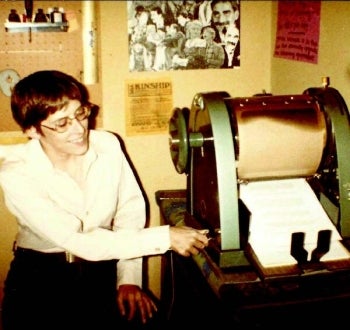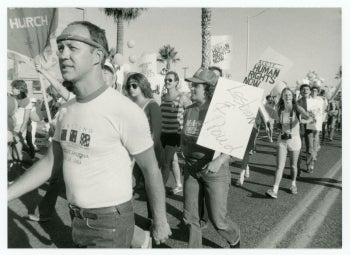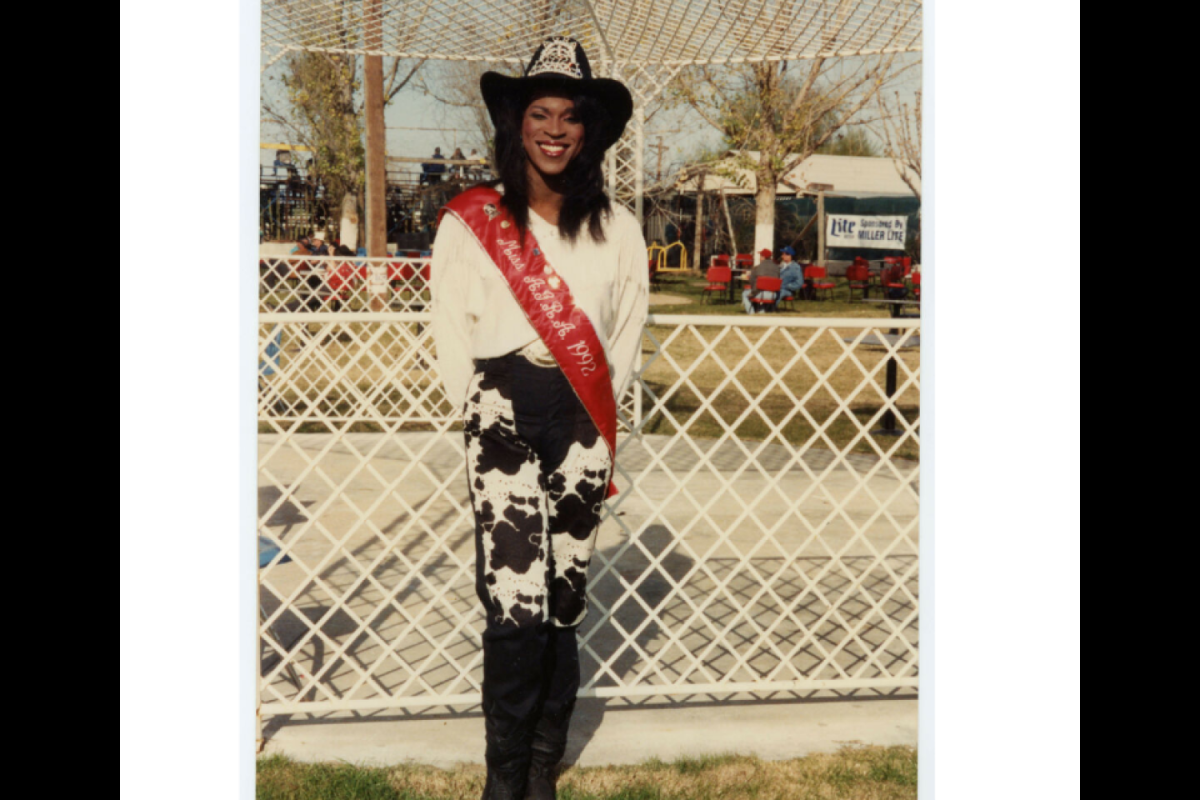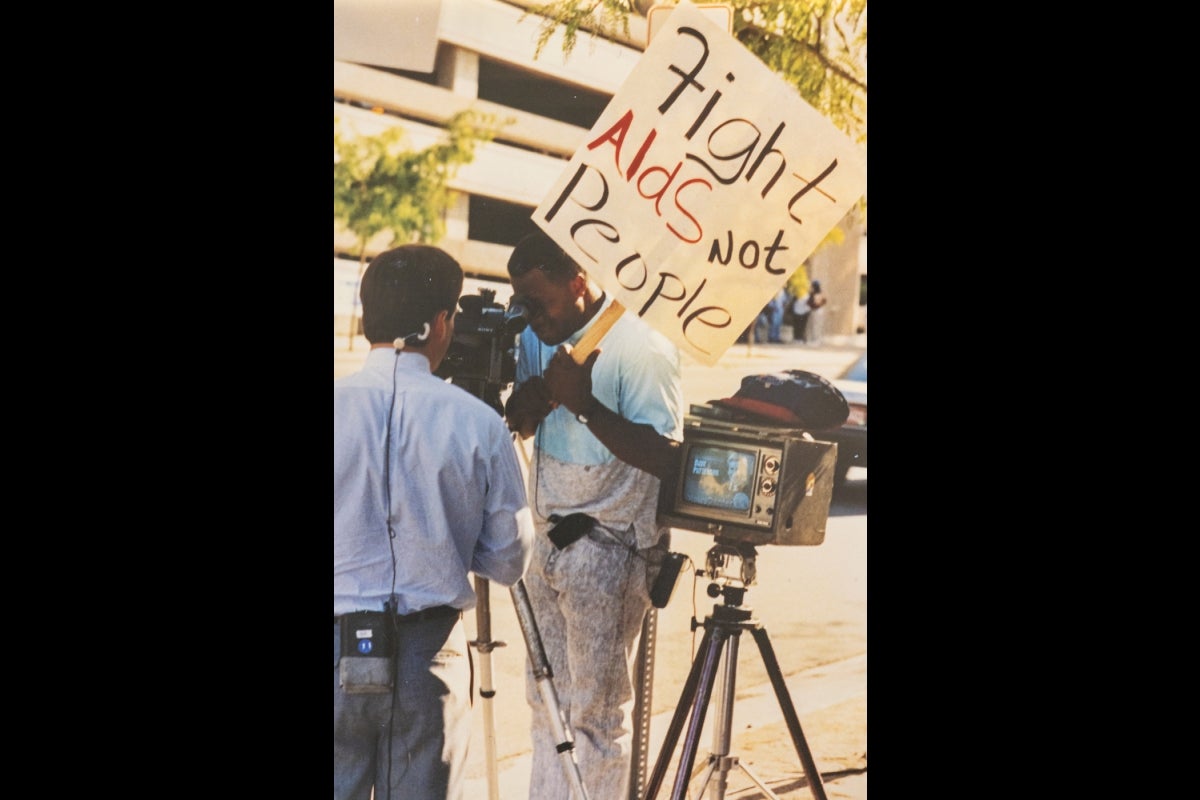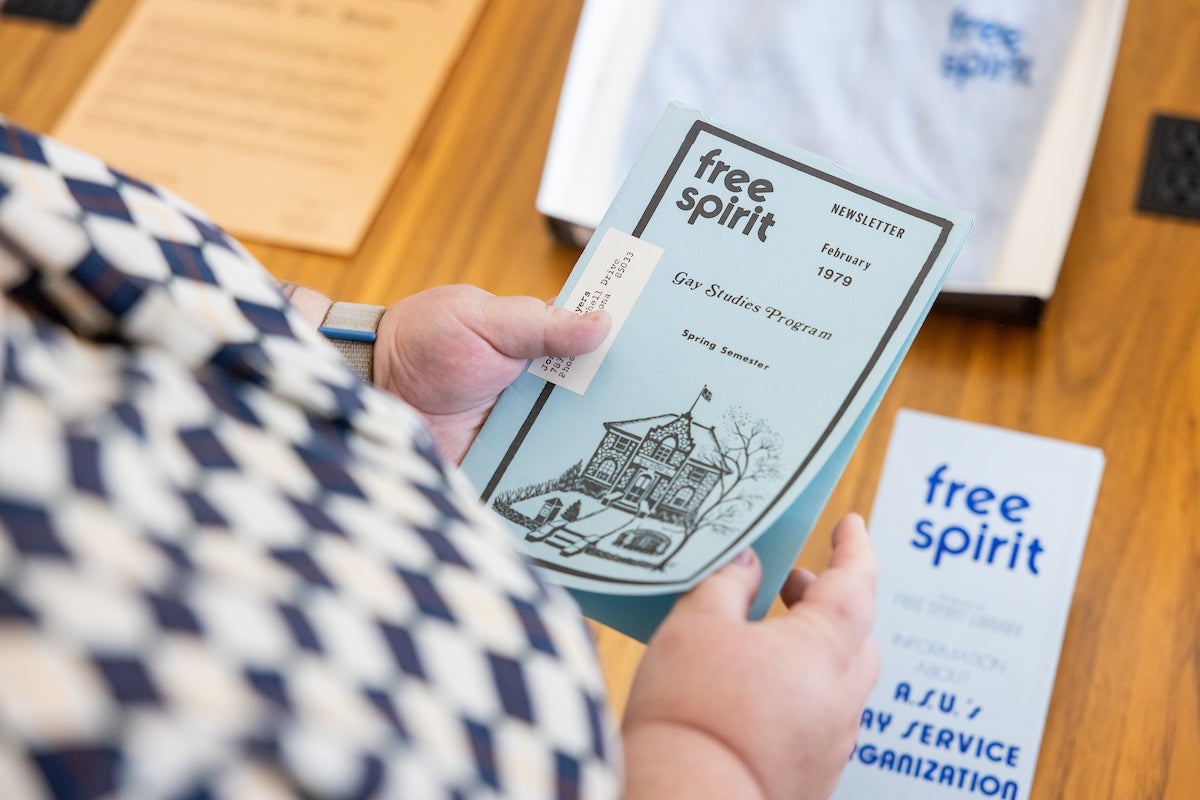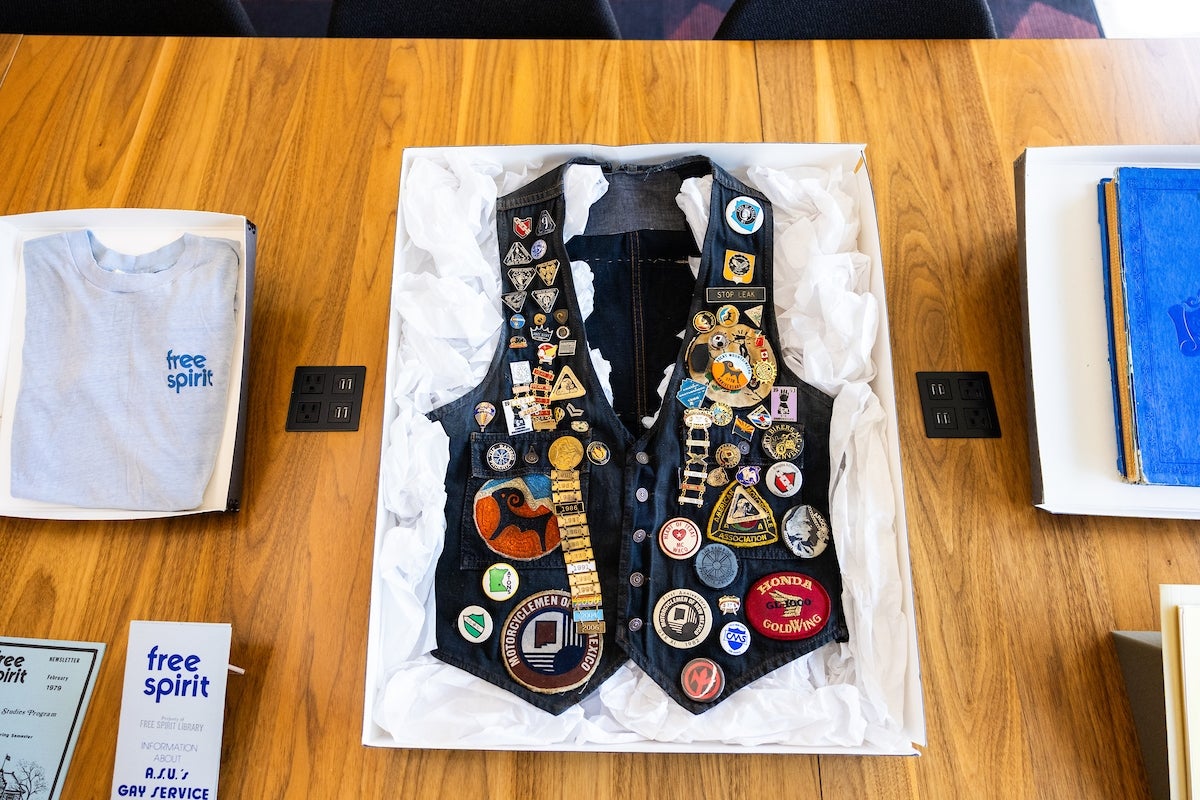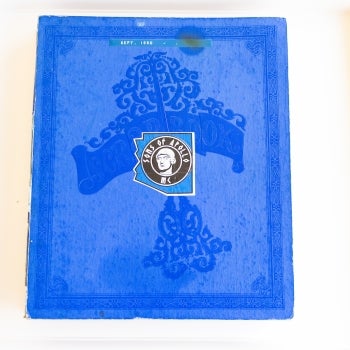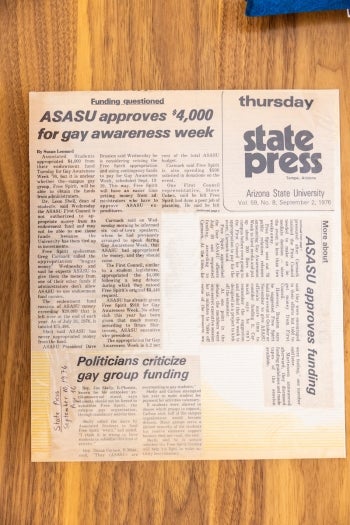LGBTQ+ Studies Collection a repository rich in legacy

Community Driven Archives Initiative Director Nancy Godoy shows elements from the Bj Bud Memorial Archives in the Hayden Library reading room on Thursday, June 6. Photo by Deanna Dent/Arizona State University
Editor’s note: This is part of a monthly series spotlighting special collections from ASU Library’s archives throughout 2024.
Arizona State University’s LGBTQ+ Studies Collection isn’t just a repository for historically underrepresented communities; it’s a celebration of resistance and survival.
“When I think about the creation of this collection, it was an act of love and tool for healing,” said Nancy Godoy, director of the Community-Driven Archives Initiative and associate archivist of ASU Library's Chicano/a Research Collection. “It’s a newer collection but it has a rich legacy.”
As LGBTQ+ communities around the world are remembering the joys and struggles of their pursuit for equality as part of Pride Month, ASU News is taking a look at how this collection came to be and how it’s impacting academia and the LGBTQ+ community at large.
“We’re all memory keepers and community archivists. For historically marginalized communities, an archive embodies intergenerational and intersectional knowledge, trauma and resilience from one generation to the next,” said Godoy, who is a mother and a member of the LGBTQ+ community. “Today’s LGBTQ+ community yearns to exist and reclaim queer narratives. They yearn to hold on to the past and nostalgia as they alter the present and future through acts of self-preservation.”
Visit the archive
For questions or to view materials regarding the LGBTQ+ Studies Collection, reach out to the ASU Library’s Ask an Archivist service.
The collection, located within the Community-Driven Archives Initiative, is the largest archival repository for LGBTQ+ history in Arizona. It comprises a handful of other archives that chronicle pioneering figures, elevate their voices and inspire the next generation of scholars to be agents of change.
An archive finds its footing
The repository got its start with the Bj Bud Memorial Archives, which was named after Harlene “Bj” Bud, a lesbian activist. It was gathered and assembled by local LGBTQ+ activists and the Valley of the Sun Gay and Lesbian Center in 1993, the same year the privately funded community center was established.
The center provided a safe space for the LGBTQ+ community in Phoenix, and sponsored and provided several health services, support groups and educational programs. Additionally, they started a small library and archive, and made it accessible to anyone who wanted to learn more about Phoenix’s LGBTQ+ community and their experiences.
When Bud passed away from ovarian cancer at age 47, the center named the archive after her.
Following the closure of the center in 2004, ASU inherited the community archive, but it sat in the library’s backlog of unprocessed collections for more than a decade. In 2017, Godoy secured a $450,000 grant from the Andrew W. Mellon Foundation for Engaging, Educating, and Empowering: Developing Community-Driven Archival Collections, a three-year project designed to reclaim and preserve the history of marginalized communities for future generations.
The Community-Driven Archives team digitized more than 9,000 images and documents from the Bj Bud Memorial Archives, which are available for anyone to view on PRISM.
“Queer visibility is so important. It takes community support and courage to be yourself," said Godoy, whose team is reimagining and transforming 21st-century academic libraries and archives by making this content accessible online to researchers, students and educators. "The Bj Bud Memorial Archives showcases how our community moves through time in a nonlinear way to uplift the stories and lives of queer people.”
Who was Bj Bud?
Bud was one of the early organizers of the gay rights movement in Phoenix. She was also an originating member of the Arizona Gay Community Council, Free Spirit, Sunday’s Childe, The Information Network and co-organizer of the first two Gay Rights Marches in Phoenix. She also participated in the 1987 recall effort of Arizona Gov. Evan Mecham and brought awareness to the AIDS crisis locally.
Born in Chicago, Illinois, Bud’s family moved to a small town in Indiana in the mid-1950s. She said the transition was tough as they were the only Jews in a municipality that was predominantly antisemitic.
It was later in college at Ball State University, where she majored in journalism, that Bud accepted her sexuality.
“I knew when I was 7 that the stereotypical ‘grow up, get married and have children’ was not going to be my lifestyle. I knew even before I was sexual that I was not going down the ‘straight and narrow’ path,” Bud once told an Arizona Republic reporter. “My being gay is as much a part of my being as my height, my sense of humor or my skin color. I cannot change my sexual orientation any more than I could change the location of my freckles.”
Bud’s friends say she was fierce, fearless and could often be abrasive.
“Bj was a small person — maybe stood 5-foot-2. But she was very unusual and extremely brash,” said Jay Myers, who met Bud in the 1970s. “I remember one time a 6-foot-4 drag queen said something at an event that Bj didn’t agree with, and Bj got right in this person’s face. She was very driven by a sense of justice.”
That tenacity is what drove Bud — day and night — to advocate for equal rights for all people. Even on her death bed.
When Bud was admitted to the hospital after her cancer diagnosis, she insisted that her room be turned into an office. According to Bud’s longtime partner Lydia Javins, Bj spent the last weeks of her life writing a grant for her AIDS organization.
Javins said, “The expression she was best known for was, ‘If you have an hour to kill, work it to death.’”
Bud died on Feb. 14, 1996.
The archive was her valentine to the LGBTQ+ community.
A different time
On the surface, the collection is your typical assortment of photos, documents, memorabilia and artifacts. But it’s the information inside that tells the story of a time when Phoenix — and society as a whole — was not as accepting of lifestyles considered outside of the norm.
“Ungodly, sick and criminal.”
Those were the words that you risked being labeled if you came “out” during the 1970s, Myers said.
“Those were the three battles that you fought if you were a known homosexual. There were a few, but not many, bright people who were accepting of us. But most of us stayed in the closet,” said Myers, who has given an oral history to the archive and donated items from his days as an activist.
Myers said he worked for Valley National Bank in 1976 when he came out. That’s the same year he, Bud and Greg Carmack co-founded Free Spirit, the first sanctioned LGBTQ+ student organization at ASU. Their goal was to provide a social organization for students outside of the bar and bathhouse scenes. They also provided a newsletter and hotline that offered information and services for the LGBTQ+ community.
Free Spirit also organized the first LGBTQ+ dance ever advertised to the general Arizona public, in which more than 900 people showed up. The May 1, 1976, dance also garnered lots of attention from the media, even though the Republic and other outlets refused to use the word “gay” in their articles.
“It rattled the holy hell out of the Arizona State Legislature because this was a publicly advertised gay dance funded by a state university,” Myers said. “A lot of the local TV, radio and print media covered it because it was controversial and stirred things up. It was in the news cycle for at least three weeks.”
Godoy said the Free Spirit newsletter and other LGBTQ+ periodicals were the lifeblood of the community at the time, which almost a half-century later offer an insight into their daily lives and struggles.
“These periodicals offer a counter narrative to a lot of local newspapers during this time,” Godoy said. “We are also seeing the community criminalized, dehumanized and these publications demonstrate how they resisted. They tell a story.”
Back to the future
That story continues today.
Seren Nutt is a member of the ASU Library staff and uses them/they pronouns.
Nutt found a coming out letter in a Pride Month book display they curated earlier this month in Hayden Library. The letter, dated from October 2006, was found tucked inside the cover of a book titled “Lesbian/Woman” (1997) by Del Martin and Phyllis Lyon.
“It was a coming out letter from someone who I assume was an anonymous ASU student,” Nutt said. “In the letter, this person talks about how they didn’t feel safe coming out as a lesbian, so they wanted to come out for the first time by writing a letter and leaving it in a book.”
Nutt said, as they read the letter, it made them think about their own coming out journey.
“Growing up, I didn’t necessarily feel comfortable coming out, so I began making anonymous posts,” Nutt said. “I’m hoping that this person who wrote the letter was able to safely come out to the people in their lives and that they found love and support just like I eventually did when I came out to my loved ones.”
Artifacts like these and Nutt’s story exemplifiesThis anonymous letter has now been incorporated into the Bj Bud Memorial Archives. both the beauty and the pain of the archive, said Pamela Stewart, ASU emeritus teaching professor and historian.
“What the archive holds doesn’t necessarily represent the fuller population and their experiences because many in the LGBTQ+ community chose not to speak up,” said Stewart, who helped Godoy process and organize the Bj Bud Memorial Archives in 2015–16. For example, even in reading a newspaper or digital news online, I always ask, ‘Where are the women? If it’s a protest or a cultural event, it’s worth asking, ‘Where are they?’ When I was organizing the photographs, it was a reminder to consider who and what is not visible.”
Stewart is also launching a new Queer and Elders Ancestors Project by conducting interviews with a cohort of older lesbian women. She said it’s important to document the voices of the past to pass on to the future.
“Today’s generation, at least in this country, often doesn’t understand the weight of those times because the LGBTQ+ community had a lot to lose,” said Stewart, who retired from ASU in 2022 and is the founder of ACTIVHISTorian.com. “They had parents who were willing to take them to court to take away their children. They could lose their jobs. They had to fake a lot and had to keep parts of their life in a ‘don’t ask/don’t tell' context. Many couldn’t tell their story.”
Others couldn’t tell their story because they are no longer here. The AIDS epidemicAccording to the National Institutes of Health, more than 700,000 people have died from AIDS-related causes since the disease first was identified in 1981. wiped out an entire generation of LGBTQ+ community members.
“We lost so many people to AIDS. Growing old and becoming a queer elder is a privilege,” Godoy said. “I hope this collection shows queer youth they have roots and a queer ancestry because they come from a long line of courageous activists that centered collective care, service and mutual aid.”
Shoring up the next chapter
As the old guard retires, new blood is taking up their mantle.
Self-proclaimed “Hip Historian” Marshall Shore is working closely with ASU as he brings in new donations and valuable artifacts from community members. One of the prized finds of the collection is the Sons of Apollo vest that was donated from an ailing member of the community who shortly after passed.
The Sons of Apollo were a motorcycle and social club of approximately 150 gay men who wore vests, conducted rides for charity and participated in community events, according to Shore.
“Everybody had a vest that had your nickname on it,” Shore said. “It was your ticket to show who you were in the society.”
One of its founders was Bill Labourne, who was the owner of Apollo’s, a bar and gathering place for the LGBTQ+ community in central Phoenix.
Four years ago, Labourne called Shore to inform him that he had cancer.
“He (Labourne) was dying of cancer, and he knew it. He asked, ‘When can we get together? It’s gotta be quick,’” Shore recalled. “I showed up at his place the next day and he said, ‘Take these.’ He had photo albums and the vest. These items are extremely important in documenting this history.”
A few weeks after Shore’s meeting with Labourne, he passed on Sept. 18, 2018.
Shore began documenting the LGBTQ+ community after 307 Lounge, a drag bar on Phoenix’s Roosevelt Street, shuttered its doors in 2000. It had been around for more than a half-century.
“Its closing galvanized a handful of us to look at the fact that our history was going away,” Shore said. “I was stunned because we had such a rich and vibrant culture here at one time.”
The collection offers proof of this — photos and literature of the Arizona Gay Rodeo Association, gay and lesbian pride parades and pageants, drag show performances, Halloween and Mardi Gras parties, dance contests, protests and group adventures to places like the Grand Canyon and Palm Springs, California.
It’s why Shore and Godoy also joined forces to create the Arizona LGBTQ+ History Project, a partnership between Phoenix Pride and ASU Library to preserve and bring awareness to Arizona’s under-documented LGBTQ+ history.
Shore said ASU is helping him to procure some of the rarer collections that might otherwise fade away.
“There has been some reluctancy to donate things because they always wonder, ‘Well, what’s going to happen to it?’” said Shore, who is using the archive to write a book about the history of the LGBTQ+ community in Phoenix and the Valley. “But with the ASU name, they know it’s been around a while and these items aren’t going to go away tomorrow.”
The LGBTQ+ Studies Collection is a living archive as well as a work in progress. It’s growing every single day but recognizes the need for more representation.
That’s why Godoy has enlisted Marivel Danielson, an associate professor in the School of Transborder Studies, to work with members of the BIPOCBlack, Indigenous and people of color communities and other marginalized groups in the area.
Godoy said she and Danielson, who teaches a course titled “Transborder Queer Performativity,” will develop and co-host creative workshops in 2024–25.
“This is part of a larger strategic plan to empower BIPOC queer communities in Arizona through storytelling and archival imagination,” Godoy said. “When you look at the Bj Bud Memorial Archive, it’s named after a white lesbian activist, but the majority of the collection preserves the gay white male perspective. We don’t want to further marginalize people or lose stories.”
In 2022, the Community-Driven Archives Initiative team was awarded the Archival Innovator Award by the Society of American Archivists. As the initiative grows this fall, archivists will launch a new Memory Lab in Hayden Library. The lab will host educational events to engage community and display items from the Bj Bud Memorial Archives.
“We’re centering empathy, reparative action and LGBTQ+ voices and knowledge. We’re also breaking cycles of erasure by teaching folks how to be community archivists and preserve history with us,” Godoy said. “We provide free access to archival training, archive starter kits and technology. Creating safe spaces that support lifelong learning and tolerance is so important. Students and community members can’t engage and learn if they don’t feel seen or safe.”
That’s a philosophy Nutt appreciated as an ASU student and now as a staff member.
“Collections like these appearing in our academic libraries show us that the university wants us here … that they care about us because they think we’re worth it,” Nutt said. “It’s affirming. It’s life giving.”
ASU News editor Emma Greguska contributed to this article.
Monthly series spotlighting ASU Library’s special collections
- January: Expanded Theatre for Youth and Community Collection remains a repository for emerging artists and educators
- February: Black Collections aims to document the lives of an underrepresented Arizona community
- March: Voices from Latin America can be found in dynamic research collection
- April: Thunderbird archives: These walls do talk
- May: Collection preserves legacy of modern architects, buildings in the Southwest
- June: LGBTQ+ Studies Collection a repository rich in legacy
- July: Pop-up book collection is deceptively simple fun
- August: A (re)source of Sun Devil pride
- September: Chicano/a Research Collection filled with action, education and activism
- October: ASU collections offer Indigenous perspective through traditional storytelling, innovative methodology
- November: University Archives chronicles more than 140 years of Sun Devil history
- December: Collection captures the robust history of Arizona
More Arts, humanities and education

Professor's acoustic research repurposed into relaxing listening sessions for all
Garth Paine, an expert in acoustic ecology, has spent years traveling the world to collect specialized audio recordings.He’s been to Costa Rica and to Ecuador as part of his research into innovative…

Filmmaker Spike Lee’s storytelling skills captivate audience at ASU event
Legendary filmmaker Spike Lee was this year’s distinguished speaker for the Delivering Democracy 2025 dialogue — a free event organized by Arizona State University’s Center for the Study of…

Grammy-winning producer Timbaland to headline ASU music industry conference
The Arizona State University Popular Music program’s Music Industry Career Conference is set to provide students with exposure to exciting career opportunities, music professionals and industry…


